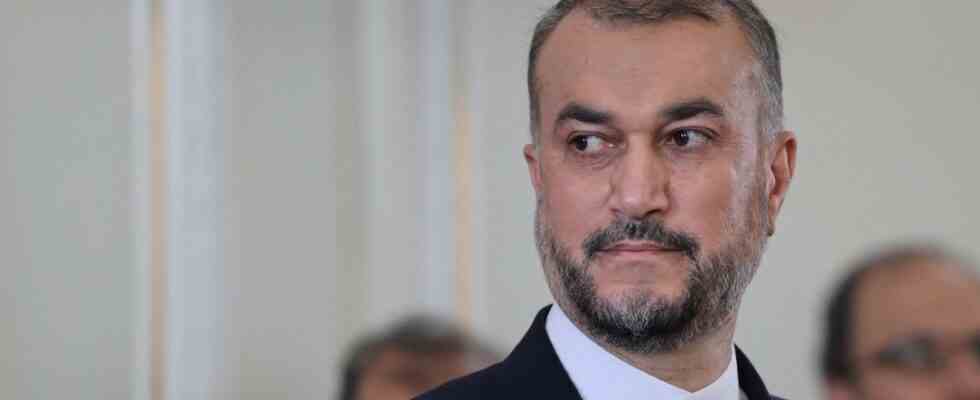The words from Tehran initially sound like a willingness to compromise: Iran welcomes “the continuation of diplomacy and negotiations,” state media quoted from a phone call between Foreign Minister Hossein Amir-Abdollahian and EU foreign policy chief Josep Borrell. He had presented a slightly modified draft of an agreement that would see the United States and the Islamic Republic return to compliance with the 2015 nuclear deal.
In fact, however, the one celebrated by the Europeans as a milestone in diplomacy stands Joint Comprehensive Plan of Action, as the deal is officially called, before the end if the hard-line regime in Tehran does not agree to the new offer within days. Borrell made it clear that the text presented on Tuesday was the Europeans’ last attempt to save the agreement. After 15 months of “intensive and constructive negotiations” with the participating states and the USA, he “reached the conclusion that the room for additional significant compromises has been exhausted,” the EU chief diplomat wrote in one Guest post for the Financial Times. The present text is the “best possible deal”. Now is the time for quick political decisions.
There are several reasons for the time pressure: On the one hand, diplomats have been warning for months that the agreement has largely lost its value. Iran has now enriched enough uranium to 60 percent that, if further enriched to 90 percent, the fissile material is sufficient for a nuclear bomb. That would only take a few weeks. Unlike the uranium quantities, the technical advances of the program cannot be scaled back. At the same time, American domestic politics plays a role: President Joe Biden would have to submit any agreement to Congress. A debate there shortly before the important midterm elections in November would be welcome campaign ammunition for the Republicans. However, should they gain a majority in the Senate, it seems unlikely that Biden will be able to push through a new deal.
Iran expects concessions from the US
But Amir-Abdollahian made it clear who the regime in Tehran sees as having an obligation to deliver: The United States has always said that they want an agreement, so this must “be visible in practice,” he demanded. Ultimately, the dispute between the US and Iran revolves around which of the unilateral sanctions Washington would lift if Iran returned to the terms of the deal, which sets tight limits on Iran’s nuclear program.
Under President Donald Trump, the United States had fined the Revolutionary Guards for supporting terrorist organizations. Iran has declined any discussion of its regional policy during the negotiations; the Revolutionary Guards and their missile program are viewed as a threat by many Arab states; an assessment shared by both the US and Europeans.
Despite this, Tehran is demanding that the sanctions against the elite unit, which reports directly to Supreme Leader Ayatollah Ali Khamenei, be completely lifted. The US is not ready for this. At best, they would exempt parts of the Guard, provided Iran guarantees that it would no longer carry out attacks on US troops in the Middle East. Tehran, on the other hand, is not prepared to do this.
In the meantime, there is growing conviction in Europe and the United States that Iran is no longer interested in the agreement – or, as diplomats put it, Tehran is under the “illusion” that the United States will soon feel compelled to make far more concessions to Iran in view of the the Russian war of aggression against Ukraine and the West’s efforts to avoid an acute crisis in the strategically important Gulf region.
Internal power struggles in Tehran
White House Middle East Coordinator Brett McGurk interprets to the news portal axios The situation is this: Iran wants the US to “put something in the pot” to help those who want an agreement in the internal debate with Supreme Leader Khamenei, but “we will not do that”. European diplomats also assume that an agreement will fail due to internal power struggles in Tehran.
The Revolutionary Guards, which are pursuing a confrontational line towards the West and are benefiting massively from the circumvention of the sanctions, have so far had the upper hand over those forces in the government who see the lifting of the sanctions as a prerequisite for Iran’s economic development and ultimately for the stability of the regime.
Should Iran take the step of enriching uranium to 90 percent, this could lead to new sanctions from the EU as well – and possibly result in a military strike against certain facilities in the nuclear program. The USA and the Europeans want to avoid such an escalation. Therefore, they should refrain from officially declaring the negotiations or the agreement to have failed. But if no agreement is reached by mid-August, that would be the de facto situation.

